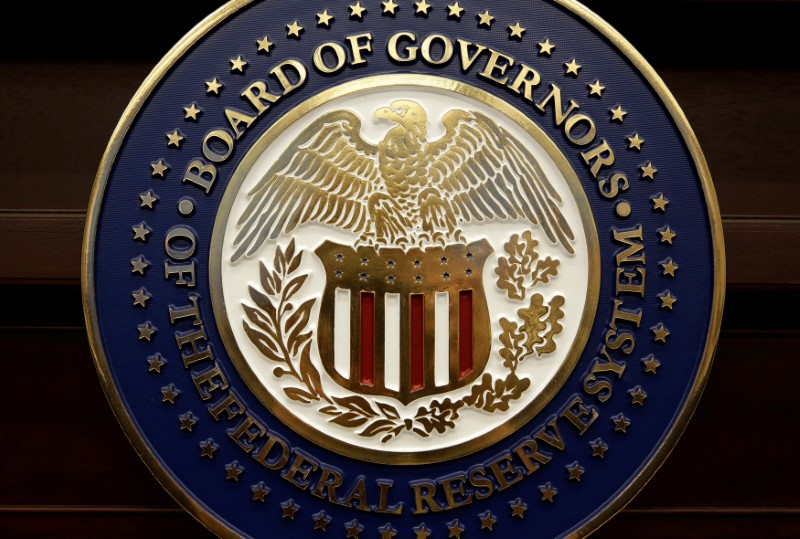 © Reuters. FILE PHOTO: The seal for the Board of Governors of the Federal Reserve System is displayed in Washington
© Reuters. FILE PHOTO: The seal for the Board of Governors of the Federal Reserve System is displayed in WashingtonSAN FRANCISCO (Reuters) – With the U.S. economy firing on all cylinders, the Federal Reserve should ease away from monetary policy accommodation and move interest rates up far enough to prevent unwanted inflation but not so fast that a recession ensues, a U.S. central banker said Tuesday.
“At a time of full employment with price stability, policy should be a neutral influence on economic activity,” Kansas City Federal Reserve Bank President Esther George said in remarks prepared for delivery to an agricultural symposium. “Gradual further increases in our policy rate will be necessary to return policy to a neutral stance, although there is considerable uncertainty about exactly how far or fast we need to go.”
The Fed has raised rates twice this year and has signaled it will raise rates twice more before the year is out, putting short-term borrowing costs within a couple of rate hikes of 2.9 percent, the Fed’s estimate of “neutral.”
George, who will resume voting on policy at the Fed’s next meeting after a two-and-half-year hiatus, has in the past called for faster rate hikes than many of her colleagues.
But her tone Tuesday was more measured, signaling that she, like most of her colleagues, is focused on reading signals from economic data and financial markets to gauge the right pace of rate hikes so as not to slow the economy unduly or allow it to grow so fast that inflation takes hold. [nL1N1UD0P3]
George said the economy is in “excellent” shape, but said she sees significant risks it could grow too fast because of fiscal stimulus and global accommodation, or slow sharply because of trade policy.
She said she worries that the Fed may be “misjudging the manageability of emerging financial imbalances” that have built up during a long period of accommodative policy.
And, she said, with unemployment at 4 percent and inflation by the Fed’s preferred measure recently ticking up to 2.3 percent, above the Fed’s 2-percent goal, “monetary policy is currently testing the limits of how low unemployment can go without causing an undesirable increase in inflation.”
Still, she did not making any overt case for faster rate hikes than her peers, citing uncertainty over the outlook and even delivering a warning about raising rates too fast. “If you’re not careful, it’s easy to overshoot, turning a room that is too hot into one that is too cold,” she said.
Fusion Media or anyone involved with Fusion Media will not accept any liability for loss or damage as a result of reliance on the information including data, quotes, charts and buy/sell signals contained within this website. Please be fully informed regarding the risks and costs associated with trading the financial markets, it is one of the riskiest investment forms possible.
Source: Investing.com



























